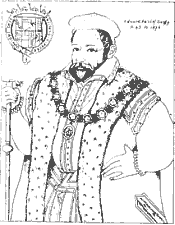
Moore has:
Edward (b. 1508. d. 1572) succeeded but, as he was only thirteen years old, his affairs were managed by commissioners, of whom Cardinal Wolsey was one, the governor and other civil authorities in Man being continued in office until he attained his majority. In 1528, he attended the cardinal on an embassy to France; and, in 1530, he was one of the peers who subscribed the declaration to Pope Clement VII. that, if he refused to confirm the divorce of Queen Catherine, his supremacy in England would be endangered. In 1532, he issued a commission to inquire into the exactions which the people of Man alleged were practised by the clergy under the guise of mortuaries or corpse-presents. In the same year he was present with Henry VIII. at his interview with Francis I. at Boulogne, and, in 1533, he was made a Knight of the Bath. He took a prominent part in suppressing the northern rebellion in 1536 and 1537. In 1542, he accompanied Thomas Howard, Duke of Norfolk, on his raid into Scotland. On the accession of Edward VI. in 1547, he received the Garter; and, in 1550, he was one of the peers who were parties to the articles of peace with the Scottish and French. In June, 1551, it was reported that he had been commanded to renounce his title to the Isle of Man and that he had refused, being prepared to resist by force. It is not known what truth there is in this, but, if any action was intended to have been taken against him, it was probably on account of his strong opposition to all religious changes [fpc: The Stanleys were later to be strongly linked with the Catholics]. For the same reason, he would have been in high favour on the accession of Queen Mary. He was then appointed lord High Steward of England and a member of the Privy Council. He was a commissioner for the trial of Lady Jane Grey and others, and, during Mary's reign, he frequently took part in the proceedings against heretics. He contrived to secure the favourable opinion of Queen Elizabeth, being one of those summoned to meet her on her entry into London. She retained him as a privy councillor and, in 1559, she appointed him chamberlain of Chester, &c. In 1561, he appointed five commissioners to examine into and establish regulations for preventing the " great Waste that hathe been made in the Castle, and in the Peele, in bread, fuell, candles, and other things," and to fix the fees of certain officers and the amount of fines and amercements due to the Lord of the Isle for infringement of the laws.
 |
The 'Portrait' is taken from The Stanley Papers [Pt II ed Rev F.R. Raines vol 31 Chetham Soc. 1853] - titled Ferdinando, Earl of Derby Æ [age] 65 AD 1594 [sic as dead 1592 at age 64] and based on portrait in possession of family of William Ffarington Comptroller at the period. |
See also Correspondence
|
|
||
|
|
||
|
Any comments, errors or omissions
gratefully received The
Editor |
||